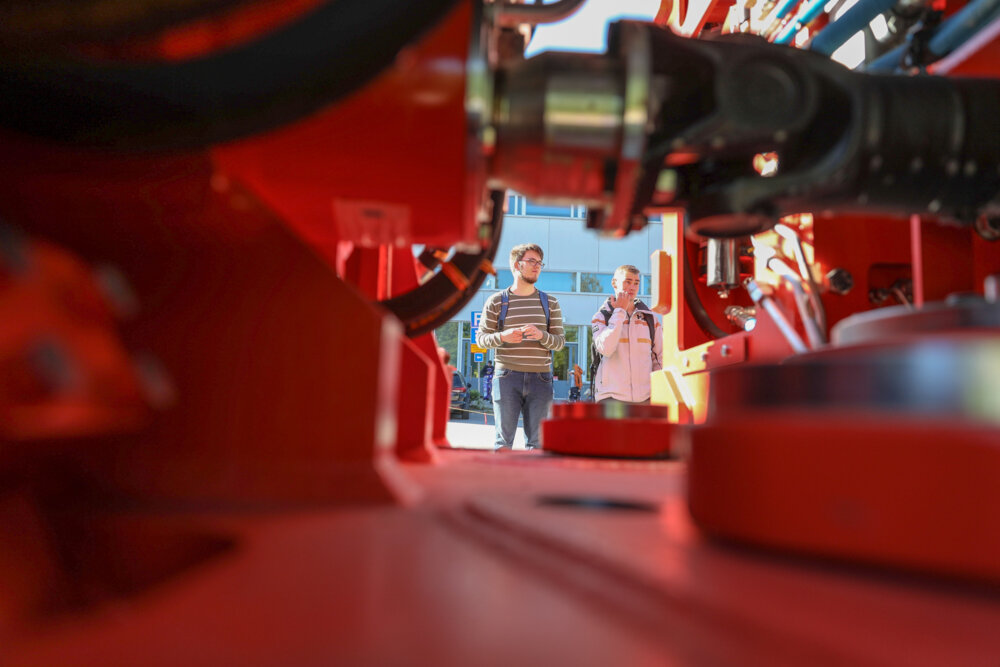Master's Degree Programme in Mechanical Engineering: Digital Design
Engineering design is a fundamental operation in the industry and other entrepreneurship. Every quality product or machine as well as its parts and associated infrastructure requires a successful design process and application of design methods.
Digitalisation not only supports design processes and methods, but also enhances business opportunities with new business models and integrated products, services and systems, enabled through information stream. Digital design improves collaboration between different engineering disciples and integrates diverse design phases like concept design, embodiment design, design evaluation, detail design and manufacturing. The track concentrates on the digital design processes in the industry, the digital design methods, and future possibilities.
Today, Masters in engineering need theoretical and practical knowledge of design, regardless of whether they are designing small or large. Design is required in all areas of mechanical engineering, and contemporary digital design methods and tools make design an exciting experience.
The Digital Design specialisation track educates professionals with foundations in design thinking and mindset, theoretical understanding, systematic methods and practical skills in designing products, services and systems, including human-centric problem solving approaches, to educate value creation leaders for smart products, services and systems.
The students will learn designing, modeling, analysis, and optimization of products, machines, structures and systems. In addition to theoretical knowledge and practical skills of design in mechanical engineering, the Digital Design specialisation track supports the students with the development of suitable personal and social competencies.
Digital Design is one of the three specialisation tracks of the Master's Degree Programme in Mechanical Engineering. The other specialisation tracks are

Entry requirements
General Requirement
You are an eligible applicant for Master’s-level studies if
- you have a nationally recognized first cycle degree – normally a Bachelor’s degree – from an accredited institution of higher education,
- your degree corresponds to at least 180 ECTS (European credits) or three years of full-time study,
- your degree is in a relevant field for the Master’s degree programme that you’re applying to. Please check the section on track-specific admission requirements for detailed degree requirements.
Language Requirements
Applicants must have excellent English language skills and a certificate that proves those skills. You can indicate your language skills by taking one of the internationally recognized English language tests.
Applicants must reach the minimum required test results to be eligible for the University of Turku. No exceptions will be made. Read more about the language requirements here.
Study right
You may not apply to more than one specialization track within the same Master’s Degree Programme at the University of Turku. Therefore, you should carefully consider the suitability of your educational background for the applied track.
Before you start preparing your application, always read the full admission requirements on the application portal Studyinfo.fi
The applicant’s previous degree based on which s/he is seeking admission to the Master’s Degree Programme in Mechanical Engineering must be in a relevant field of study. Relevant fields for the Digital Design specialisation track are
- mechanical engineering
- materials engineering
- systems engineering
- industrial engineering
- industrial design
- civil engineering
You may not apply to more than one specialization track within the same Master’s Degree Programme at the University of Turku. Therefore, you should carefully consider the suitability of your educational background for the applied track.
The decision of admission will be based on
- the relevance of the applicant’s awarded degree(s)
- the amount, relevance, and grades of the courses in the degree(s)
- the language test result (see Language requirements)
- the motivation letter (see full entry requirements for the obligatory motivation letter template)
- possible relevant work experience
- possible interview
The academic evaluation is made only for complete applications received during the application period. Any preliminary assessment of suitability or chances for admission will not be given.
Programme in brief
The Master’s Degree Programme in Mechanical Engineering: Digital Design is a two-year programme of 120 ECTS credits.
- Joint mechanical engineering studies 20 ECTS
- Digital Design studies 20 ECTS
- Thesis and project 40 ECTS
- Minor or Thematic Studies 20-25 ECTS
- Other studies 15-20 ECTS
Curriculum is published in the study guide.
The University of Turku fosters students' professional growth and global perspective by promoting internships and student exchanges. Every degree student can take advantage of these opportunities – all internships come with a guaranteed subsidy, and every exchange programme includes a grant.
Does this page answer your questions about the programme's content and academic matters? If not, contact infoscitech@utu.fi.
At at the Department of Mechanical and Materials Engineering, we aim to establish a high-quality and attractive research environment for mechanical and materials engineering.
The focus of mechanical engineering research is on smart systems, laser based manufacturing processes and digital and system design.
Learn more about the research at the Department of Mechanical and Materials Engineering.
Masters’ theses topics are immensely versatile since mechanical engineering is present in every industry. Typical topics include the design of new machines or components, finding new solutions for existing problems, or developing design processes.
Career prospects
Master's Degree Programme in Mechanical Engineering: Digital Design gives students the necessary knowledge and tools for modern industrial engineering design. The common courses in the programme give students skills in modern digitalised design, manufacturing, and management. The courses in digital design deepen the students’ knowledge and skills in human-centered design thinking, digital design methods and analysis, product-service systems design, simulation and optimisation, and modeling for manufacturing and reverse engineering.
The students get professional experience in an industrial environment in master’s thesis and project work. Students learn communications skills in writing reports, oral presentations of their results, and information retrieval. The free elective courses enable students to focus on the topics of their interest in relevant fields like robotics, data analysis, and numerical analysis.
After the study in digital design, the students will be able to conceive and evaluate concepts and embodiments of products, services and systems working with modern digital design methods and tools, simulate advanced thermomechanical problems, optimise product and structure designs, integrate design, analysis, manufacturing as well as product-life cycle applications and services.
The students can recognise opportunities in an industrial framework for applying the learned skills and tools and motivate their use. Students can read engineering reports, communicate their results in written reports and oral presentations and motivate and vision the benefits of implementing digital design methodologies in the industry.
The students will learn personal and social competencies during their studies. The program trains analytical and conceptual thinking as well as teamwork abilities and leadership. The programme will prepare next generation design innovation leaders equipped with foundations in design and integrative power enabled by information stream.
Possible job titles are:
- design engineer,
- product development manager,
- team leader,
- structural specialist,
- industrial metrology expert,
- digital design specialist
After graduation the students will be eligible to the doctoral studies at the University of Turku in mechanical engineering.

